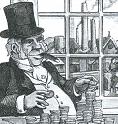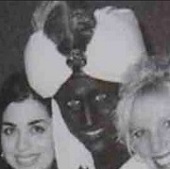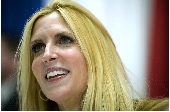|
CRISPYBABY posted:It describes the majority of Canada, USA, and probably most first world countries tbh. Political polls that say that people want both lower taxes/government funding and better social services are pretty much the norm everywhere I think, because collectively people are dumb as poo poo. It's because the right has been engaged in a 50 year propaganda campaign to tell the public that their government is full of bloat and excess. People think they can do both because they still think the well of efficency cuts it's something that exists and still has room
|
|
|
|

|
| # ? May 14, 2024 16:51 |
|
.
James Baud fucked around with this message at 12:01 on Aug 25, 2018 |
|
|
|
i really hope dougie comes up with another ferris wheel idea and people can start to see hes a loving dolt just like his brother
|
|
|
|
apatheticman posted:It's because the right has been engaged in a 50 year propaganda campaign to tell the public that their government is full of bloat and excess. By 50 years did you mean 1811 pages?
|
|
|
|
RBC posted:i really hope dougie comes up with another ferris wheel idea and people can start to see hes a loving dolt just like his brother "any land that we take from the green belt, we'll replace" 
|
|
|
|
RBC posted:i really hope dougie comes up with another ferris wheel idea and people can start to see hes a loving dolt just like his brother He's got to make a big show of supporting some social conservative values at some point, they're a huge part of his coalition.
|
|
|
|
I was a little salty when I called em dumb as poo poo, but anyways yeah, on any given poll that asks individual questions about policy rather than overall plan people will say that we want to keep more money and also have better services because humans have short attention spans and are generally bad at collective planning/understanding altruism to people you don't see on a regular basis because our brains literally suck at that. Anyways that's less of a Canadian thing and more of a political generality.
|
|
|
|
Can I (a British Columbian) donate to Ontario election campaigns?
|
|
|
|
You need to be a resident of Ontario.
|
|
|
|
Well that's smart of them. Maybe next time.
|
|
|
|
Reince Penis posted:He's got to make a big show of supporting some social conservative values at some point, they're a huge part of his coalition. The Robert Bruce Ford MegaMall And Church Experience Nestled majestically in the halton hills conservation lands, at the junction of 3 new 400 series highways for your convienence.
|
|
|
|
Oh my god they stole Jeremy Corbyn's slogan
|
|
|
|
I know we just made a joke about left-alignment, but the slogan is off-center to the right inside the box
|
|
|
|
So in the Globe the other day there was a right up from the guy at Ekos polling describing some research they've been doing into Canadian political attitudes and how they've changed in response to economy over the last ten years:Globe and Mail posted:Ontario is not immune to political populism I don't like some of the ways that they frame this data but it's still a interesting to see how people are making sense of recent shifts in Canadian politics. The tl;dr here would be that Canada is no longer divided between 'left' and 'right, instead the division is between the optimistic, cosmopolitan and upwardly mobile urban dwelling members of the middle and upper class vs Trumpian small government right-wing populists who are skeptical about immigration and feel a mixture of cultural and economic anxiety I think there's a lot of understated bias behind the way these numbers are interpreted and the methodology behind the polling isn't amazing (see below) but it's still interesting to read. If nothing else you can think of this as a guide for how the liberal punditocracy in Canada will try to make sense of right-wing populism entering our politics. Ekos Research posted:
Here are a few of the charts that I pulled form the report. There's also some stuff on the geographic distribution of "open" vs "ordered" people.       Big proviso here is that their methodology doesn't sound amazing: quote:Methodology: It's a big data set but who knows how they weight the data they get from mass interactive voice response polls. Always remember that each polling company has its own formula for how it weighs a poll and that you can massage data to fit a preconceived narrative. Nevertheless, some interesting trends that Ekos claims to identify here. Also, let's take a moment to dwell on that one line, which I don't think gets nearly the attention you would expect: "By more than two to one, Canadians agree that if present trends with inequality at the top continue then we are going to see ‘violent class conflicts’."
|
|
|
|
One more Ekos chart, this one's about the Ontario election:
|
|
|
|
Hey now, The City of Toronto is a strong independent entity with its own special legislation. We can even levy some of our own tolls and fees! I mean, not for long, because they don't last more than one administration, but we could if we wanted to.
|
|
|
|
Helsing posted:You're describing a folk theory version of the standard theory of democratic inveolvement, in which political parties act as entrepreneurs who min-max their positions to attract the ideal winning coalition of voters. It's intuitive plausible but actually not very well supported empirically. In fact there's a bunch of research indicating that people often get involved in a cause before they develop strong ideological attachments to that cause. A friend gets you to come out to a rally, or you check out a meeting because it looks interesting, etc., then as you're drawn into group activities you internalize the group's ideas and make them your own. I appreciate the effort post, that is interesting. I'm not even using the word "platform" to refer to their pre-election policy document, it's more like a literal platform, the performance art where they signal and motivate their tribe. I really regret not getting to a pre-election Trump rally just to witness in person the purest form of what you're talking about. It doesn't look like Doug Ford is even going to release a policy document because it doesn't matter but his platform is obviously just not being Kathleen Wynne. It's perfect. It's made even better that she doesn't seem to fully grasp how much people genuinely dislike her. Doug Ford and he PCPO hasn't spent a ton of money or time pushing populism on us. We just have such a wildly unpopular incumbent that the challenger is populist by default. No matter what they say, they will appeal to the concerns of ordinary people.
|
|
|
|
Peaceful Anarchy posted:LOL at thinking this only applies to first world countries. As much as people love to whine about taxes here in Canada, the mental disconnect between "people pay taxes" and "government provides services" is nowhere near what I've seen from people all across the political spectrum in South America. Admittedly my experience is limited, but the disdain for the concept of personal taxes for middle class people exceeds most Canadian conservatives and the expectation of government services (for them on the right, for everyone on the left) is pretty high. They don't see government as a product of the populace, but as an overclass you vote for every so often. The stupid thing is that progressive taxation means that you CAN have more government services without raising taxes on like 90% of the population by placing a higher burden on the people who can most afford it. But of course since those people are the ones with all the money and power they've made it their purpose in life to convince people that "taxes" are a huge monolithic entity and that any tax increase at any level will cause YOUR taxes to go up.
|
|
|
|
Helsing posted:One more Ekos chart, this one's about the Ontario election: thats so depressing
|
|
|
|
Helsing posted:One more Ekos chart, this one's about the Ontario election: that's depressing. i'm probably not even going to vote this go around. the NDP isn't running a candidate in my riding that I've been able to find, so I can't pity vote to get that subsidy cash in their pockets. and I actually like the NDP platform horwath put together. Ontario sucks.
|
|
|
|
RIP Greenbelt. I hope they just go all out and make brutalist styles buildings just as an even bigger gently caress you.
|
|
|
|
Helsing posted:One more Ekos chart, this one's about the Ontario election: How exactly are they defining upper class so that it's large enough to have any kind of sampling size, that seems like it should be impossible.
|
|
|
|
Martian Manfucker posted:that's depressing. i'm probably not even going to vote this go around. the NDP isn't running a candidate in my riding that I've been able to find, so I can't pity vote to get that subsidy cash in their pockets. and I actually like the NDP platform horwath put together. Ontario sucks. You should vote instead of not voting
|
|
|
|
vote marxist lenninist or something
|
|
|
|
Helsing posted:So in the Globe the other day there was a right up from the guy at Ekos polling describing some research they've been doing into Canadian political attitudes and how they've changed in response to economy over the last ten years: EDIT: nevermind I need more chill in my life and less deliberately whipping Canpol up into a storm. It's angry funny to do but I need less of that. Still, this is a good post. Hope we can reverse this trend. EDIT2: also, it may not be literal millions of dollars, but the GoFundMe for those poor kids that got hit up at Nelson House is not being ignored. They actually went past their first goal 
EvilJoven fucked around with this message at 13:10 on May 1, 2018 |
|
|
|
The Duggler posted:You should vote instead of not voting make me
|
|
|
|
Helsing posted:Eikos stuff This is interesting to compare with current US politics, where the most relevant factor for Trump's support (as a bellwether for conservative populism) is racial resentment. Ascribing Trump's success to "economic anxiety" risks obscuring the explicitly racist dimension of his support. On the other hand it's hard to look at that breakdown of PC support in Ontario by education/income level (and associated survey) and see it as originating from anything but an economically decaying (non-urban) middle class. Nocturtle fucked around with this message at 14:04 on May 1, 2018 |
|
|
|
Martian Manfucker posted:that's depressing. i'm probably not even going to vote this go around. the NDP isn't running a candidate in my riding that I've been able to find, so I can't pity vote to get that subsidy cash in their pockets. and I actually like the NDP platform horwath put together. Ontario sucks. Hey you should definitely vote it only takes like 20 mins every 4 years. Are you really so lazy you can't spare 20 mins every 4 years? Because if you are you may want to speak to a doctor.
|
|
|
|
I can't find any specifics on how EKOS purports to break down Ontario into 4 distinct classes (each with a significant sample size) but it has to be garbage.
|
|
|
|
Nocturtle posted:This is interesting to compare with current US politics, where the most relevant factor for Trump's support (as a bellwether for conservative populism) is racial resentment. Ascribing Trump's success to "economic anxiety" risks obscuring the explicitly racist dimension of his support. On the other hand it's hard to look at that breakdown of PC support in Ontario by education/income level (and associated survey) and see it as originating from anything but an economically decaying (non-urban) middle class. Unless the urban working-class/poor are similarly inclined to vote PC, I'd argue it's still rooted in cultural anxiety rather than economic issues. It's just that Canadian culture anxiety is somewhat less based on racism than it is in the US.
|
|
|
|
Nocturtle posted:This is interesting to compare with current US politics, where the most relevant factor for Trump's support (as a bellwether for conservative populism) is racial resentment. Ascribing Trump's success to "economic anxiety" risks obscuring the explicitly racist dimension of his support. On the other hand it's hard to look at that breakdown of PC support in Ontario by education/income level (and associated survey) and see it as originating from anything but an economically decaying (non-urban) middle class. I have to run but very briefly: - high levels of inequality exacerbate status anxiety and make people very worried about where they stand on the social status ladder - the easiest way to cement your position on the ladder is to keep down those below you - fear of losing status may have been a more significant motivating factor for Trump voters than economic anxiety itself - status comes in many forms: economic, racial, gender, etc., status anxiety can manifest along any of these lines
|
|
|
|
Martian Manfucker posted:that's depressing. i'm probably not even going to vote this go around. the NDP isn't running a candidate in my riding that I've been able to find, so I can't pity vote to get that subsidy cash in their pockets. and I actually like the NDP platform horwath put together. Ontario sucks. The nomination in my riding will be held this Sunday. Give it time. AFAIK liberals and conservatives are still nominating or appointing candidates as well.
|
|
|
|
vyelkin posted:I have to run but very briefly: Dismally, given what Helsing has to say about voting becoming more of a tribal popularity contest that's more about getting your guys to the polls and their guys to stay home, and the well-known demographic (racial and gender) voting patterns in the United States, it would seem that white Republicans are actually entirely accurate in their fears that demographic change will effectively disenfranchise them. I'm honestly not sure what to make of the future of a government system that pits classes of people together instead of ideas, visions and plans. infernal machines posted:Hey now, The City of Toronto is a strong independent entity with its own special legislation. Only because Ontario says so. 
|
|
|
|
David Corbett posted:
See: all of human history (and probably some smart apes too)
|
|
|
|
DynamicSloth posted:I can't find any specifics on how EKOS purports to break down Ontario into 4 distinct classes (each with a significant sample size) but it has to be garbage. Respondents self-identify their class in a regular survey question. From what I remember, the proportion identifying as upper class is usually pretty small, in about the 1%-2% range. Edit: A public report released in 2017 by Ekos has 4% of respondents identifying as upper class. Health Services fucked around with this message at 15:32 on May 1, 2018 |
|
|
|
The Duggler posted:See: all of human history (and probably some smart apes too) Holy poo poo you're a marxist???
|
|
|
|
Reince Penis posted:Holy poo poo you're a marxist??? York U did it to me
|
|
|
|
I was supposed to be a paper pusher in the communist utopia... Not whatever THIS is!
|
|
|
|
The Duggler posted:I was supposed to be a paper pusher in the communist utopia... Not whatever THIS is! Comrade I think you find if you read enough online comment boards Chairman Wynne's COMMUNIST LIBERAL HELLTOPIA is already upon us
|
|
|
|

|
| # ? May 14, 2024 16:51 |
|
Health Services posted:Respondents self-identify their class in a regular survey question. From what I remember, the proportion identifying as upper class is usually pretty small, in about the 1%-2% range. That would indicate a sample size of maaaaybe 42 people at most for upper class, it's pretty meaningless to make claims about the voting intention of the "upper class" with that size, not to mention people are certainly self-reporting inaccurately.
|
|
|




























